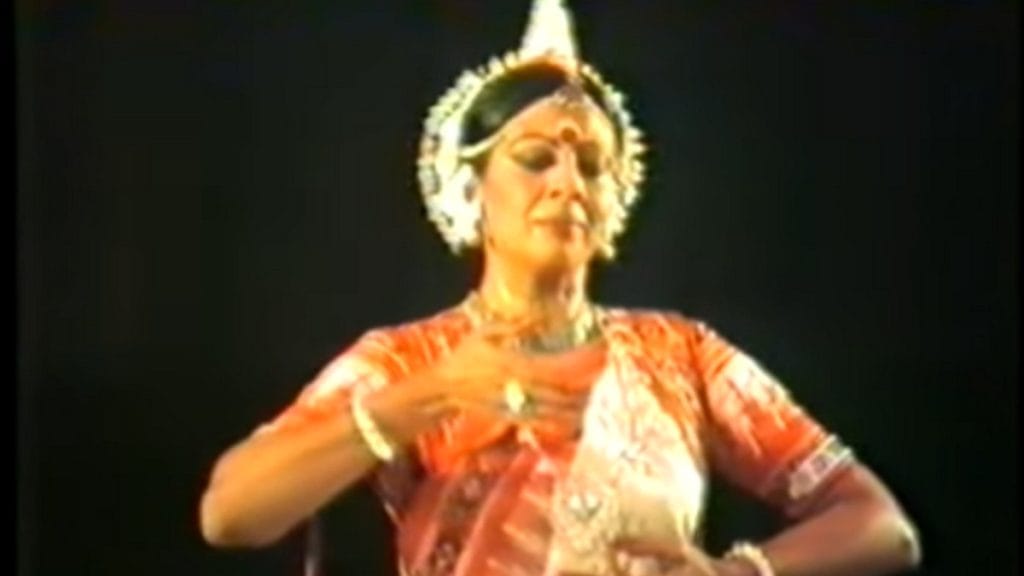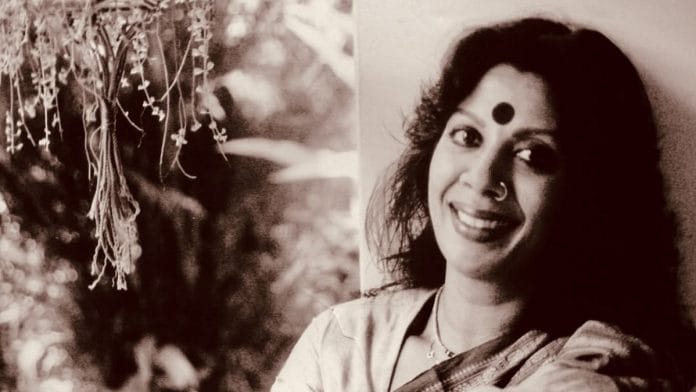In August 1998, somewhere along the rugged trail to Kailash Mansarovar, near Pithoragarh, a landslide swept away 60 pilgrims. Among them was Protima Gauri, once Protima Bedi: model, dancer, iconoclast, sannyasin. Her remains were never found.
Bachi Karkaria, a friend and chronicler of her later years, recalled writing a lighthearted column warning the Himalayan Yeti to beware of Protima, a woman whose arrival could “shake up the mighty Himalaya.”
The irony was merciless.
It was an ending almost too perfectly mythic for a woman who had lived as if she were crafting her own legend and who never wanted to die like a common person.
“Protima Bedi was the original Brat,” Karkaria wrote in her column of the time Protima famously ‘streaked’ across Juhu beach. “Equally gob-smacking was her career switch, from celeb model to celeb disciple of Odissi revivalist, Guru Kelucharan Mohapatra.”
Also Read: Mangala Narlikar changed how girls in India learn math. She took the fear out of it
Life, death, and revival
Protima Bedi lived her life on her own terms.
“I could not — and I would not — be a Sita to my husband or a Radha to my lovers. And I doubt if I have been a Yashodha to my children. In other words, as far as the world is concerned, I have been a total flop,” she wrote in Timepass: The Memoirs of Protima Bedi, which was published posthumously.
Her first brush with death came at seven. Her younger sister had replaced a box of chocolates with Brooklax tablets. Protima, eating all of the purgatives, collapsed. A doctor pronounced her dead. Her body was washed and prepared for the pyre—until she abruptly woke. In Timepass, she cast the episode in the language of Hindu mythology: Urvashi, the celestial nymph, tricking Yama, Lord of Death, and slipping into a new life unnoticed.
“Yamraj had not yet arrived, and he could be easily fooled. Urvashi descended into her new abode. I was reborn,” she wrote.
Born in 1949, Protima was the middle child to her Haryanvi father and Bengali mother. She called her birth a “disaster” to them because they didn’t want another daughter. In Timepass, she writes of feeling an acute sense of neglect, especially after her brother was born. Over time, though, she channelled her feelings into cultivating a more brazen persona.
“Since nobody cared about me in any case, I would rebel against everybody and everything by being a bad girl… Even in those days I wasn’t disturbed by what people thought of me,” she wrote.
Marriage to actor Kabir Bedi and then motherhood did not dilute this spirit.
In 1974, pictures appeared of Protima—then a successful model—running naked down a beach in Bombay in broad daylight. The “streaking” incident, allegedly for a film magazine, scandalised Mumbaikars and made her a tabloid staple. Her daughter, Pooja Bedi, was only five at the time.
“All the children in my school say their mummies said you ran nanga,” she told her mother.
Protima’s reply was calm: “This is my life. No one has the right to tell me how to live it. When you grow up, you will make your own choices. It will be your life, and you will live it your way.”
But just a year later, an accident of fate rerouted her.
On her way to dinner at a trendy restaurant, she stopped by the Bhulabhai Memorial Institute, where an Odissi performance was taking place. She froze in her tracks.
She had grown up mocking Indian classical arts as relics for “middle-class frogs in the well.” But the “beauty, grace, sensuousness and lyricism” of the performance she saw shattered her assumptions.
The very next day, she flew to Odisha. At twenty-six, she began training under Guru Kelucharan Mohapatra. The transformation was total.

She shed the surname that linked her to her estranged husband, Kabir Bedi, and took a new one, Protima Gauri. Guru Kelucharan told her she had shown her Kali form, and now she must reveal her Gauri form.
By 1989, she had built Nrityagram, a dance gurukul outside Bengaluru, designed as a village where all seven classical dance forms of India could flourish together. She lived in a tent until its seven planned “villages” were complete.
Karkaria recalled Protima, her head shorn, emerging from her hut with an umbrella, accompanied by a Swiss mountain dog she’d call her “Hessaraghatta hound”.
Barely seven years after Nrityagram was set up, tragedy struck. In 1997, her son Siddharth, who was battling schizophrenia, died by suicide. Protima was devastated. A year later, she renounced Nrityagram, leaving it in the hands of her friend Lynne Fernandez and disciple Surupa Sen, and set out on a pilgrimage to Kailash Mansarovar.
Also Read: Who was Ramabai Ambedkar behind the songs & statues? She suffered, sacrificed, snapped back
‘Reached heaven’
In life, Protima was both adored and derided.
“I have broken every single rule our society has so carefully constructed for over 2,000 years,” she wrote in Timepass. “I have flaunted my youth, my sex, my intelligence, shamelessly. I have loved many, been loved by some… People have ostracised me, humiliated me, eulogised me. And yet I know enough to say with conviction that it is easy to be happy—so very, very easy.”
Protima revelled in ageing. She was no longer ravenous for attention and found it “wonderfully liberating” that she did not feel the need for a man in her life.
“You have only to ready yourself, to allow things to happen as they should,” she declared in her autobiography a year before her death. And she stayed true to her words.
Weeks after her death, a crumpled, mud-streaked envelope arrived in Karkaria’s mailbox. The handwriting was unmistakable. In it, Protima had written: “I feel I’ve already reached heaven, I am finally at peace.”
(Edited by Asavari Singh)






